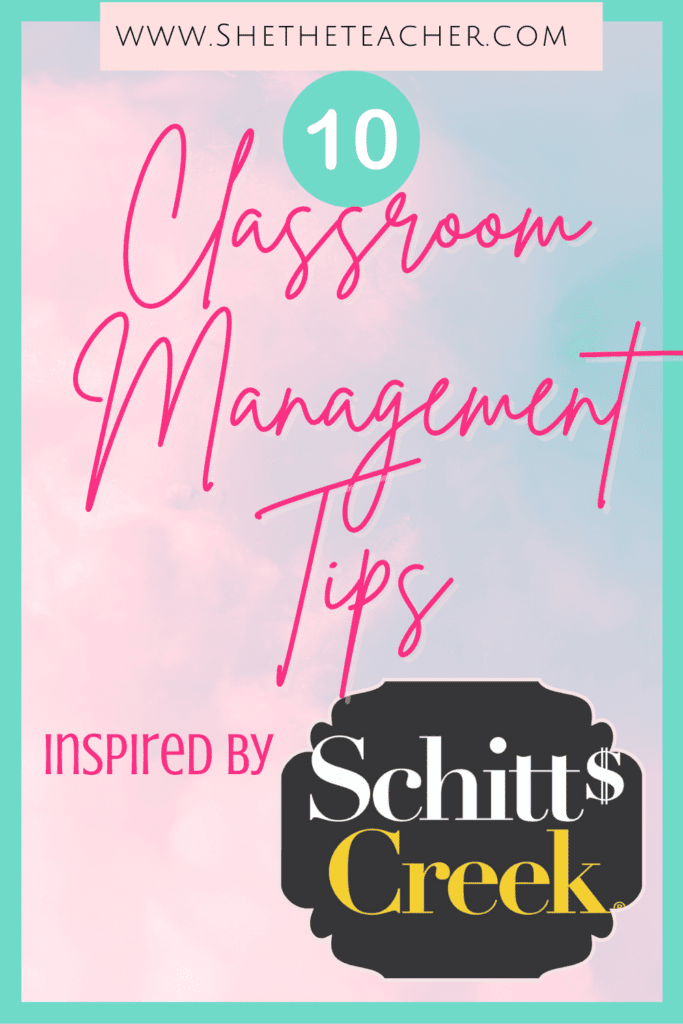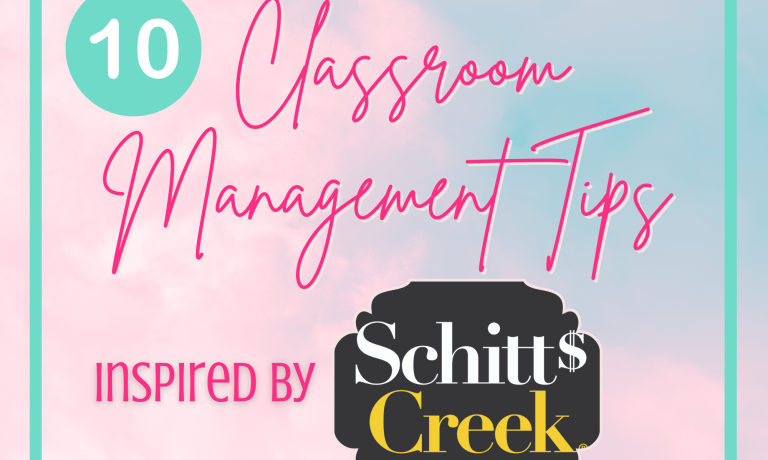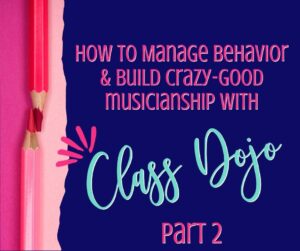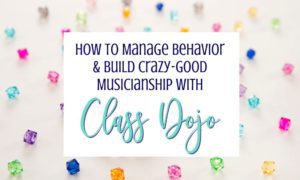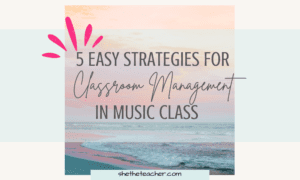Classroom management is one of the most crucial aspects of a teacher’s job and still, it feels incredibly elusive and painful to lots of us (“Ew, David”- am I right?). But, I promise you, all you need is a solid plan, some good inspiration, and a hefty sprinkling of humor. It’s ok to admit it isn’t all fine all the time- that’s how we grow!
In the meantime, who better to inspire us, than our favorite Rose family? They have plenty of inadvertent wisdom to share.

Self-care is your #1 tool to having and building healthy classroom relationships.
Put on your oxygen mask first!
“If airplane safety videos have taught me anything, David, it’s that a mother puts her own mask on first.”
Moira
The analogy of the oxygen mask is used so heavily in education right now, but just because it’s popular doesn’t make it any less true. You can’t hope to be a beacon of hope and positivity if you’re burning on empty on the inside.
So, before you hope to change the world in your classroom, set your head and heart in the right place by taking care of your physical, emotional, and mental health first. If you don’t know where to start, I’ve got you covered!
Click here to read more of my favorite tips for self-care!
Get good sleep!
“Oh, I’d kill for a good coma right now.”
Moira
Get enough sleep. Seriously. I know, without a shadow of a doubt, that a well-managed classroom depends on my ability to think clearly and not take everything personally. I can easily say that most of those days where I dissolved into tears in front of my class were due to frustration caused by lack of sleep. It IS that simple.

Have a classroom management plan in place on Day 1, and be prepared to reteach it throughout the year.
Have a plan!
“Well, David, these kinds of parties take time, and planning. Now, when I planned that Casablanca-themed party for your mother’s 40th, I had to quarantine the camels for a month.”
Johnny
I learned the hard way my first year of teaching, that not having a plan for every behavior scenario is going to cause meltdowns (from both me AND the kids). As you develop your classroom management plan, the beautiful thing is that you don’t need to do it alone. Meet with a mentor, a teacher friend, or read one of the countless books on the topic that you can find on Amazon or through your local library and come up with a plan for every situation you can think of. Here’s some just a few policies to think through to get you started:
- Cellphones/snacks
- Bathroom Passes
- Materials: what to do when someone doesn’t have something/distribution/collection.
- How to enter/exit the room
- Beginning of class routine
- Raising hands/shout-it-out answering
- How to handle misbehavior (warnings, numbers on fingers, proximity)
- Student removal from room
Plan to reteach!
“What kind of barnyard were you raised in?”
David
Have you ever gone back to school after Spring Break, Summer Vacation, or even a long weekend and thought to yourself, ‘Have they[students] forgotten how to be LITERAL HUMAN BEINGS??!?’
Kids are bouncing off the walls, someone snuck in a bag of Takis chips, cell phones are out in every class, no one brought a pencil. . . yikes, you get the picture.
Plan ahead for every. single. anomalous. event. to be an opportunity for reteaching. Don’t wait until you’re back in class after a long break, near tears at the destruction, to plan on reteaching some expectations. Get ahead of the curve and MAKE IT FUN!

Be a teacher that kids listen to (and enjoy listening to)!
Look the part!
“I don’t skate through life, David. I walk through life. In really nice shoes.”
Alexis
Look the part. Students take teachers seriously who look like they take themselves seriously. Though I had always heard this in college, I didn’t realize how true it was until I really started upping my professional attire (black slacks, heels/boots, dresses, blazers). It’s incredible how much that impacted the extra little level of respect that students (and even other staff members) give. I’m 5’2″ so every single OUNCE of “take-me-seriously” energy I can give off, the better.

Lead with humor!
“I miss being surrounded by loose acquaintances who think I’m funny and smart and charming.”
Alexis
Lead with humor whenever possible. No one likes to learn from a curmudgeon (I actually had to google how to spell that). Think back on your time in school. Who were the teachers that you enjoyed most and remember now? Odds are they were the ones who made you smile, who treated you with a friendly attitude, and who used humor regularly. Rules are yucky even for adults (especially for adults) to follow. Help lessen the pain of following through with your classroom management plan by lightening the mood with humor.
Read some more tips on adding in humor to lessons here!
Classroom Management Best Practices
Truly notice your students!
“Do I have to remind you of the time that I was taken hostage on David Geffen’s yacht by Somali pirates for a week, and nobody answered my texts?!”
Alexis
Notice your students. Seems obvious, right? Wrong. So often we’re caught up with what we need to get done that day that we fail to truly see out students. Here are some of the things I try to do:
- Learn their names in the first week (2 weeks tops). Yes, it is a big challenge (especially if you have all new kids) but learning names is critical for two reasons:
- It is your KEY to having more solid classroom management from the beginning of the year.
- It helps kids feel respected and important in your room. If you know them, they feel just that much more appreciated and welcomed by you.
- Call home or email your student if they miss more than one day of school (and you don’t know why). I always made it a habit to call kids at home who weren’t feeling well (often just leaving them a message on their answering machine telling them I missed them), but now, in the age of tech, I send them a quick email telling them a couple things they missed and how I hope they’re doing ok.
- Remember little facts about them. I’d have students fill out index cards at the beginning of the school year with a bunch of different facts about themselves (hobbies, family they live with, favorite foods and tv shows etc). I’d pull a card from the front of a stack and make sure I could connect with that kid sometime during the day (even if just for a couple minute conversation). As I cycled through, I could see kids I hadn’t connected with yet and it helped give me a visual of those who need some extra love.
Ask for help!
“Just remember: no sudden movements, do not reach for the glove box, and no matter what happens, do not tell them your real name.”
Alexis
Say you’ve hit a point in the year where your classroom management has fallen apart a little (we’ve ALL been there) and you’re not quite sure what’s going wrong. When in doubt, your admin are usually great resources for giving insight on classroom management!
One of my favorite things to do is to reach out to my admin if I feel like my class behavior is falling apart (especially if I can’t get a handle on things at the beginning of the year with a certain group). I’d schedule a time for them to come do an observation and request some classroom management pointers.
Here’s the beauty of it: If you request an observation, you aren’t put on the spot. You can plan on their being there, they can help provide some extra leverage for misbehavior, and you have a second pair of eyes in the room. It’s also great because your administrator will get to help you on YOUR accord (and they love doing requested observations). In my experience, planned observations with a clear objective yield really helpful results.
If you don’t feel comfortable asking your admin for an observation, reach out to a mentor, colleague, counselor, or instructional coach. Just make sure to get a non-biased, third party to see what you can’t see.
Make parents/guardians your allies!
“I’m trying very hard not to connect with people right now.”
David
I know it’s tempting not to call and connect with parents. ‘What if they yell at me?’ ‘What if it’s a bad time?’ These are valid concerns, but in all honesty, 99% of the time parents WANT the phone call from you and will make time to talk. Sure, every once in a blue moon, you’ll catch the wrong parent on the wrong day and get an earful, but it’s ok!
Part of being a teacher is communicating with parents/guardians for both the good AND the bad. Make it a habit to call at least as many parents for positive reasons as you do for negative reasons. Why? Because it helps put parents on your side (AND it helps you to remember that most parents are lovely people who adore their kids).

Don’t let the little things slide!
“David, what you did was impulsive, capricious and melodramatic. But it was also wrong.”
Moira
It’ll be a couple days to weeks into the school year, and you’ll have this situation happen: you have clearly explained a rule or an expectation and you notice a student is subtly breaking that rule. It usually won’t be obvious. Maybe they have headphones in when they walk in the room or they have a closed bag of chips in their hoodie pocket. Maybe they blurted out an answer to a question instead of raising their hand or are just a little out of dress-code.
Whatever it is, there will be a moment, where you question if you should say something; if you should remind them to put their headphones in their locker, report their dress-code violation, or give them a warning for yelling out something in class. I want you to follow through.
It’ll feel like you’re overreacting. It’ll feel like you take 2 steps backwards in your relationship with that student. But, trust me, attacking a problem head on when it’s a itty-bitty, tiny problem will save you from ruining your relationship with that student when things really get out of hand.
Every single time. Whatever you do, follow through.
Final thoughts
“There is nothing wrong with asking for what you deserve.”
Alexis
Classroom management is daunting. There are so many things to consider while also playing the balancing act of transmitting lessons and an education to your students, making your classroom a welcoming place, and cultivating positive relationships with every child.
But, easily one of the most important things you can do for your students is to set boundaries for them. Students without boundaries will test to find the boundaries (often at the price of misbehavior). But, classroom management isn’t just for your students, it’s for YOU too. Having a plan and structure ensures that you run your class in a positive, healthy way and it maintains your status as the person in charge.
No one is saying it’s cool to rule with an iron fist (though if that’s your style and you can do it in a positive way, more power to ya!) but it will help you maintain your authority. Because you’re the teacher. You’re the one who has dedicated your life to helping young mind, and you deserve to be treated with respect.
Want to learn more? Cult of Pedagogy has a WEALTH of information on classroom management. Click here!

What’s your favorite classroom management tip (or favorite Schitt’s Creek quote)? Leave a comment below!

